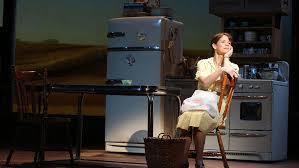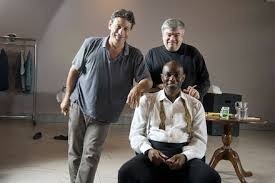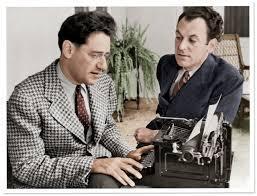Terry Teachout's Blog, page 20
February 24, 2014
MUSEUM
Just because: a Stan Freberg commercial (I)
(This is the latest in a series of arts-related videos that appear in this space each Monday and Wednesday.)
February 21, 2014
The man that got away
* * *
The producers of "The Bridges of Madison County" were smart to bill it as "Broadway's New Romantic Musical." Full-bore romanticism is in short supply on the musical-comedy stage these days--it almost always comes slathered in just-kidding-folks irony and pastiche--and Jason Robert Brown and Marsha Norman hold nothing back in their stage version of Robert James Waller's 1992 novel about an itinerant photographer (Steven Pasquale) who falls for an Italian-born rural housewife (Kelli O'Hara) and spends four days wooing, winning, bedding and losing her in between assignments for the National Geographic. The score is lush, the sentiments starry-eyed, and if you're the happy owner of one of the 12 million copies of Mr. Waller's book that are currently in print, this show's for you.
 If, on the other hand, you regard the novel and its Clint Eastwood-directed 1995 screen adaptation as sticky bucketfuls of diabetes bait, there are still reasons to see "Bridges," the first and best of which is Ms. O'Hara. Her open-hearted performance is as believably acted and immaculately sung as anything she's ever done....
If, on the other hand, you regard the novel and its Clint Eastwood-directed 1995 screen adaptation as sticky bucketfuls of diabetes bait, there are still reasons to see "Bridges," the first and best of which is Ms. O'Hara. Her open-hearted performance is as believably acted and immaculately sung as anything she's ever done....Up to a point, Mr. Brown's warm, expansive score is an equally strong selling point for "Bridges." Parts of it are as musically exciting as anything heard on Broadway since Stephen Sondheim's glory days....
But Mr. Brown is rather better at writing scenes than songs, and except for "Another Life," a sweetly folk-flavored ballad sung in a flashback by Robert's ex-wife (Whitney Bashor), none of the songs in "The Bridges of Madison County" has a clear-cut, boldly shaped melodic profile--or, for that matter, a truly memorable lyric. This would be less of a problem if Mr. Brown and Ms. Norman, who wrote the book, hadn't decided to open up Mr. Waller's uneventful plot by packing "Bridges" with short ensemble numbers that illustrate the memories of its two principal characters. The result is a musical that feels dramatically choppy, and in which the songs rarely seem to pay off....
* * *
Read the whole thing here .
Almanac: Constant Lambert on Puccini
Constant Lambert, "Puccini: A Vindication"
February 20, 2014
Rally 'round the flag!

So you want to see a show?
Here's my list of recommended Broadway, off-Broadway, and out-of-town shows, updated weekly. In all cases, I gave these shows favorable reviews (if sometimes qualifiedly so) in The Wall Street Journal when they opened. For more information, click on the title.
BROADWAY:
• A Gentleman's Guide to Love & Murder (musical, PG-13, reviewed here)
• Matilda (musical, G, most performances sold out last week, reviewed here)
• No Man's Land/Waiting for Godot (drama, PG-13, playing in rotating repertory, closes Mar. 30, reviewed here)
• Once (musical, G/PG-13, reviewed here)
• Outside Mullingar (comedy, PG-13, closes Mar. 16, reviewed here)
OFF BROADWAY:
• Avenue Q (musical, R, adult subject matter and one show-stopping scene of puppet-on-puppet sex, reviewed here)
• The Fantasticks (musical, G, suitable for children capable of enjoying a love story, reviewed here)
CLOSING SOON OFF BROADWAY:
• Hamlet/Saint Joan (drama, G/PG-13, remounting of off-Broadway productions, playing in rotating repertory, closes Mar. 9, original productions reviewed here)
CLOSING SOON IN ORLANDO, FLA.:
• The Life and Adventures of Nicholas Nickleby, Parts I and II (drama, G/PG-13, playing in rotating repertory, closes Mar. 9, reviewed here)
CLOSING NEXT WEEK IN GLENCOE, ILL.:
• Port Authority (drama, PG-13, closes Mar. 2, reviewed here)
CLOSING NEXT WEEK IN WEST PALM BEACH, FLA.:
• Old Times (drama, PG-13, closes Mar. 2, reviewed here)
Almanac: Constant Lambert on technique
Constant Lambert, Music Ho!
February 19, 2014
Full circle
 Am I nervous about the fast-approaching opening night of
Satchmo at the Waldorf
? Knowing what I know about the utter unpredictability of the theater business, I'd be crazy if I weren't. Mostly, though, I just walk around feeling slightly distracted. It isn't exactly a pleasant sensation, but it could be a whole lot worse. (It's a good thing, though, that I'm not driving anywhere these days. I shudder at the thought of finding myself behind the wheel of a car right now.)
Am I nervous about the fast-approaching opening night of
Satchmo at the Waldorf
? Knowing what I know about the utter unpredictability of the theater business, I'd be crazy if I weren't. Mostly, though, I just walk around feeling slightly distracted. It isn't exactly a pleasant sensation, but it could be a whole lot worse. (It's a good thing, though, that I'm not driving anywhere these days. I shudder at the thought of finding myself behind the wheel of a car right now.)This isn't to say that I'm confident that Satchmo will go over in New York. I'm not, to put it very, very mildly, even though the previews have gone well so far. But I believe that I've done my best, such as it is, and I know that I have a singularly gifted star and director. So insofar as I can think about other things, I do. When I can't, I work, and when I haven't any work to do, I go to the Westside Theatre and hang out. It's a comforting place to be, a windowless chamber cut off from the outside world whose busy occupants are wholly dedicated to the gratifying task of ensuring that the off-Broadway transfer of my first play looks and sounds as good as is humanly possible.
The closer we get to March 4, the better I see how accurately Moss Hart described what I'm feeling right now in Act One, his 1959 autobiography. It tells the stomach-churning story of how he collaborated with George S. Kaufman on Once in a Lifetime, a comedy that opened on Broadway in 1930 after much preliminary chaos and made the twenty-five-year-old Hart a celebrity in a single stroke of good fortune (preceded by a grueling year of appallingly hard work). The book describes in excruciating detail every setback and sleepless night that stood between the writing of the first draft of Once in a Lifetime and the publication of the reviews that turned it into a hit. It's a wonderful, terrible tale whose happy ending redeems all the horrors that lead up to it.
 James Lapine, as it happens, has just turned Act One into a play, and his stage version open at Lincoln Center Theater later this season. I can't wait to see it, not least because I'll know by then whether Satchmo at the Waldorf is a hit, a flop, or something in between.
James Lapine, as it happens, has just turned Act One into a play, and his stage version open at Lincoln Center Theater later this season. I can't wait to see it, not least because I'll know by then whether Satchmo at the Waldorf is a hit, a flop, or something in between.I read Act One for the first time when I was a teenager. I'd just joined the high-school drama club, and Hart's tales of theatrical derring-do filled me with dreams of a life on the stage, dreams that were soon supplanted by a different, more practical set of music-related fantasies. To be sure, I continued to work on shows until I graduated from college, but then I put the theater behind me--permanently, I assumed.
Even after I became the drama critic of The Wall Street Journal, it never occurred to me, not even for a moment, that a time would come when I'd know exactly how Moss Hart felt as he waited for Once in a Lifetime to open:
I walked toward Once in a Lifetime for the last time--that final walk every playwright takes toward his play, knowing that it is no longer his, that it belongs to the actors and the audience now, that a part of himself is to be judged by strangers and that he can only watch it as a stranger himself. The main consideration of his day, the keystone that has dictated his every waking moment, the cause that has enlisted his being for all these months, is at an end. He moves toward his destination with mixed emotions--it is the completion he has sought, but there is the ache of finality in it. He is at last a spectator--a spectator with the largest stake in the gamble of the evening, but a spectator nonetheless.
No, it isn't pleasant. But like I said, it could be worse.
Snapshot: a Leonard Bernstein premiere
For a partial list of the members of the studio band, go here .
(This is the latest in a series of arts-related videos that appear in this space each Monday and Wednesday.)
Almanac: Constant Lambert on individuality
Constant Lambert, Music Ho!
Terry Teachout's Blog
- Terry Teachout's profile
- 45 followers



